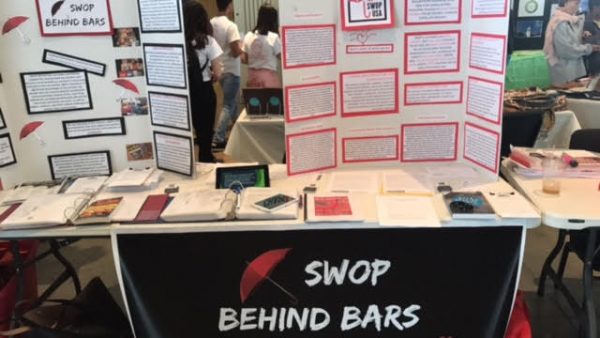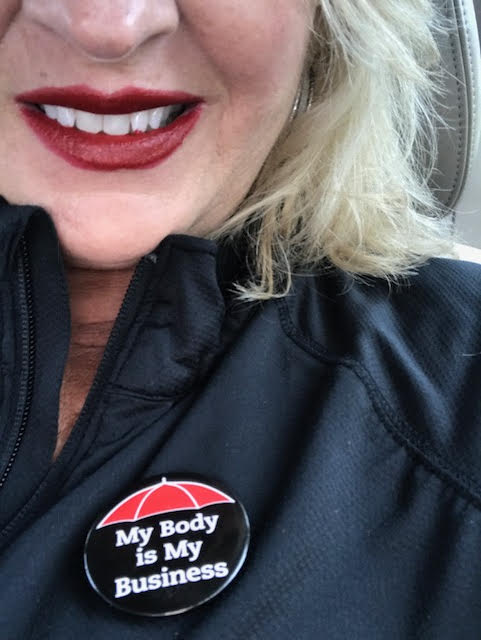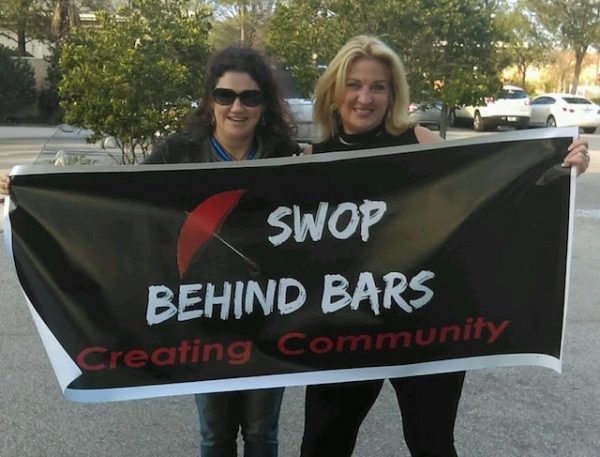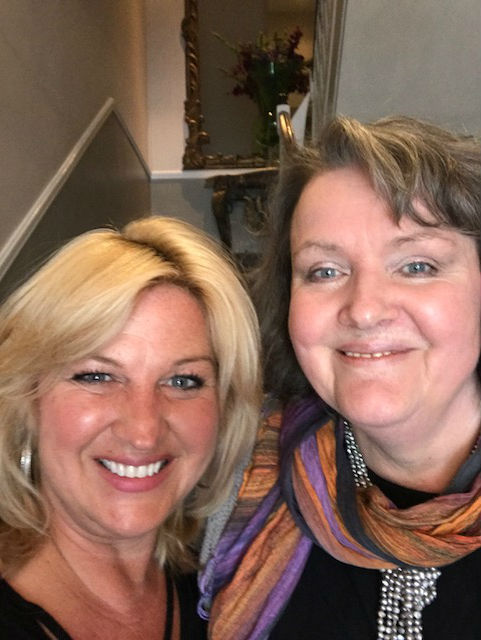
Alex Andrews is the 53-year old lead organizer of both SWOP-Orlando and SWOP Behind Bars and the new North American representative to the Global Network of Sex Work Projects (NSWP). For almost a decade and a half in her younger years, she did various forms of sex work—beginning with stripping to supplement her hair dressing income, she went on to do escort and phone sex work, as well as to run her own escort service. She bowed out of active sex work in 1998 because, she explains,”multiple arrests and incarceration put [me] at risk for spending way more time in prison than [I] was willing to serve.” But she continued to represent sex worker interests in local anti-trafficking organizations and to do community work supporting incarcerated sex workers. In 2016, she started SWOP Behind Bars specifically to serve the needs of imprisoned sex workers, and in its year or so of operation, the organization has been extremely effective, providing vital resources for this population. The interview below is a condensed and edited version of an e-mail correspondence I had with Andrews on her work at SWOP Behind Bars.
How did SWOP Behind Bars get started?
We got started when I engaged an anti-trafficking corrections officer from a local women’s prison in a Twitter fight. I was on my civvie Twitter account and some other sex worker activists joined me and we [were] just hammering this guy on his philosophies and the way that women were treated in prison, particularly sex workers. After about an hour of just being humiliated by some of the most respected activists in the U.S. responding to his patronizing tweets, he suddenly direct messaged me that he hated his organization as much as we did.
He turned out to have been one of the key factors to [as to] why the Lowell Women’s Prison was investigated by the Miami Herald and these articles […resulted in] getting about six people fired, including the assistant warden. I met with him the following week and then Dr. Jill McCracken joined me for another meeting a couple weeks later. Katherine Koster jumped in and suggested we ask SWOP-USA for some money. And next thing you know, we had a website, Facebook, Twitter, and a newsletter. It went out to about 200 people the first month (May 2016) and we have almost doubled our requests every month.
Why do you think there wasn’t a peer organization specifically formed around supporting incarcerated sex workers before, since so much of the U.S. movement is focused around the injustice of sex worker arrest and incarceration? Is it because usually sex workers are only incarcerated for prostitution for relatively small periods of time, even though they may often be incarcerated for longer for other survival “crimes” such as trafficking charges, assault or murder charges incurred in self-defense against violent clients, and drug possession?
Well, there are actually a lot of people who are working inside of county jails all over the country. Jacqueline Robarge has been working with incarcerated sex workers in Baltimore for more than 10 or 15 years. SWOP-Baltimore has an active book donation program. Sherrie in San Antonio recently got her chaplain’s license so she could actually go into the prisons and jails and meet with incarcerated sex workers. We are far from the only prison program. LGBT Books to Prisoners sends resource packets inside every three months. Black and Pink is almost legendary in the work they do with pen pals. Everything they do is a study in perfection!
But the great thing that kept sex workers from really digging in? Fear. There is within all of us a terror of engaging with the criminal justice system. We try so hard to avoid cops and probation officers and courts…I still get incredibly nervous when I get pulled over or find myself behind a uniformed cop at the grocery store. We didn’t know what we would find. There are many of us that have worked within our county jail systems and done street outreach but I think the idea of engaging with women in PRISON was just terrifying. [It’s] “whorearchy” and though many of us reject that idea…we all recognize it exists.
SWOP Behind Bars was unifying is some weird kind of way. We all felt it pretty strongly. The entire community wanted to reach out to these folks and we found the least frightening—and yet the easiest—way to do it! Completely by accident.
As a fellow white woman, how do you deal with the racial disparities that must come up in your work? It’s much more likely for imprisoned sex workers to be people of color and for the sex workers with the time and privilege to do activism to help them to be white. How do you accommodate for that fact and the power imbalance involved in SWOP Behind Bars’ work?
I have found that being a white women of privilege working with incarcerated people of color is much like being a man talking about abortion. Shut the fuck up. People of color can and DO speak for themselves if we white people would just get out of the fucking way. We shoot ourselves in the foot time and time again because we keep thinking we have to “Do Something For Them”, when really the best thing to do is make sure we haven’t gobbled up all the access to resources. I would never try to tell someone what they need or how to get it…I’m absolutely rigid in requiring consent before working on behalf of someone else.
White people have oppressed and exploited people of color for centuries. I may not be able to stop that, but I intend to exploit every ounce of my white privilege to make lots of room for voices that want to be heard. If we concentrate really hard on including people who might be different than us to lead the way instead of insisting that they follow us…well, that’s a good start. The next step is making sure we are doing that for the right reason and not tokenizing them. And after that, step down! Take a back seat and be supportive and don’t suck all the air out of the room. For the love of all things holy—it’s not about us, so we should let the people who know what they need make the decisions.
SWOP Behind Bars has a significant service component to its work. Though there are some powerful service organizations in the movement, such as St James Infirmary, many peer organizations don’t have the resources to maintain direct service action. What tips can you give other peer organizations and sex worker activists in general about how to sustain service work in their communities?
PARTNER! Stop doing things alone! Put aside personal dislikes or differences and engage with other organizations and do meaningful work. Sex workers self-isolate for lots of different reasons. But we share the social media spaces and we get to know each other a little better.
Some of us have infiltrated service networks. Others have partnered with like-minded human rights community-based organizations. There are a LOT of sex worker rights folks already doing stuff in county jails—they just don’t come in waving their red umbrella. Go to meetings that are outside your comfort zone because you know they may share some—if not all—of the your viewpoints. Start explaining decrim to people who don’t understand the difference [between decriminalization and legalization]. Carry copies of the Amnesty International policy recommending full decrim world wide and hand them to people who just saw headlines and didn’t get it. Engage with your public defenders’ offices. Especially if they have a social worker component. Public defenders LOVE the idea of decriminalizing sex work because it would take a load of work off their desks.
And don’t be afraid to LISTEN. We TALK a lot because we have a LOT to say…but sometimes it’s important to let other people talk, and they will reveal how they feel and then we can tailor our response to meet their need. I go to anti-trafficking meetings and take lots of fact-based literature with me and hand it out. They don’t have to hear me say everything out loud. Understanding sex worker rights has to be absorbed slowly. They need to have time to fully understand how the things they are doing—like end demand and raid and rescue—harm us. They digest it a little more slowly by reading it at home when they have time.
Believe me—when a sex worker rights activist goes in an anti-trafficking space, we are unicorns. Most [of them] have never seen one. They don’t know we exist.
 Tell me about your pen pal program signing up sex workers and allies to write to incarcerated workers.
Tell me about your pen pal program signing up sex workers and allies to write to incarcerated workers.
Getting mail when you are in prison is a huge deal. When people are getting mail, the other prisoners and the guards know they have people on the outside and they tend to be more respected…less likely to be preyed upon. Within a week or two of the newsletter going out, the mailbox suddenly started getting slammed and we could no longer physically answer all the mail. Katherine [Koster] was getting carpal tunnel from hand-writing so many responses, so we asked the community if they wanted pen pals and so we created a pen pal program.
At one point we had more pen pals than prisoners. But people get busy with their lives or disappointed when they don’t get a reply and stop writing, so we always need a new influx of pen pals. Since most of our folks are extremely poor, having the funds to write back…to buy paper or stamps…it’s a real hardship for them. We haven’t come up with a very good way of knowing when people get moved or released so there’s a lot of back office kind of work to do. And every prison is different. Some have limits on the number of papers you can send. Others don’t take red envelopes. Some of them don’t want any art.
Our pen pals are a huge reason for our success. Getting mail from the outside is an important way to help sex workers stay safe. If you are ever on Twitter or Facebook and see a request for support for an incarcerated sex worker in jail and are asked to send a postcard—it is because we want to flood that particular jail with mail to let [their] corrections officers know that they have outside support and shouldn’t be messed with. We had great success with our calls for support for mail to Celeste Guap when she was arrested in Florida. Look for our hashtag, #WeAreWatching, combined with #sexworker and keep a few stamped postcards handy so you can quickly and easily pop a card in the mail and possibly be a protective angel through the mail.
Reading is one of the few productive and autonomous activities prisoners can engage in. Tell me about the various ways SWOP Behind Bars provides reading materials to inmates—your Books Behinds Bars Project, your newsletter, and your prison library. Have you had problems with prison censorship of the reading material at all?
We were originally having all the books sent to our contact at the prison so he could put the books in the library. They came so thick and fast that he was having trouble explaining how he was getting all these books donated to the prison library. And then the first girl that got out after engaging with us several times told us the prisoners rarely get to the library, [so] we decided to create Amazon wishlists for each of them.
The community just blew up buying books. We couldn’t keep the lists updated quickly enough. We haven’t had any books rejected yet but the newsletter sometimes gets refused. In fact, that is happening more and more. We are working on different ways to get our message into the prison but we are going to need some really committed pen pals to keep our connections strong.

You’ve done a lot of work as a watchdog monitoring the activities of your local vice department and local anti-trafficking organizations. Can you tell us about that work and what you’ve learned about how to reduce the harm law enforcement and abolitionists do to sex workers locally?
Ha! Watchdog. Yeah, I guess that’s kind of right.
Because I’ve been involved in service to incarcerated folks for so long, I know a lot of anti-trafficking people. I used to be welcomed at the private meetings—even considered a “stakeholder” member. But they were really looking for someone who would be more “victim”-like or “survivor”-oriented and I’ve always been a very empowered person and I believed that empowering people is the first step…no rescue cape needed. And I made a lot of noise at these meetings about what were they going to do to help these folks get housing and food and clothes and they just didn’t like not having a really heavily rule-based “program” in place. I kept telling them that the girls didn’t like “programs” and they sure didn’t want to have to commit to Bible study every day. They need jobs and friends and GED’s and education and makeup and internet access and cell phones. They didn’t like that and I was asked to leave the task force. I had one of the leaders of the local faith-based movement try to tell the cops I was running a brothel and selling drugs just to get me out and diminish my credibility. The cops didn’t believe her (thank the goddess) but I realized my time with them was over and I couldn’t keep helping people when they got out of jail unless I separated myself from them.
Now that I have SWOP-USA, my community, and NSWP to back me up, I’m no longer afraid and I have more evidence-based research to show how harm reduction approaches work better and rights are better than rescue. Besides…these people need to be watched carefully. They can be dangerous—even when they don’t mean to be. So I guess a watch dog is an OK thing to be.
If I could just be granted one wish—it would be to be able to make law enforcement understand how harmful they are with all the arresting. Our local Vice unit has a culture of cops having sex with the women they have arrested in the past and they think it’s all consensual and that it’s ok for them to foster relationships with their victims or the people they arrest. And it’s just not ok with me. Every year there is a new batch of stories about women they have “rescued” from sex work—only to prey on them when they are at their most vulnerable.
Can you tell us about some of the individual incarcerated sex workers whose cases SWOP Behind Bars has followed?
If a sex worker is released, and she wants to share her story, we will offer her an opportunity to do that, but she has to have complete control over the publication, the editing, and the way it gets distributed. We do not solicit their stories. In fact, we ask very little in the way of questions. But we have asked several of incarcerated and formerly incarcerated folks to be on our board of directors. We have asked them to write columns in our newsletter. We have sent a few to conferences. We let them make those decisions in their own time when they want to do it voluntarily and we let them know we will help them share their story.
Dr. Jill McCracken is doing some amazing work with a girl in a federal prison via video conferencing and email and they will be presenting at a conference soon using technology to allow this girl to speak out from behind prison walls. And of course I do Facebook introductions every once in a while, and your readers are always welcomed to engage these folks. Their lives are very complicated and they have so many barriers in front of them. Sometimes it takes them awhile to reach out for support. It’s enough to know we are there. They don’t need us questioning them and being all up in their face. They need some peace and quiet time and a chance to get their feet on stable ground. They’ve learned to not trust ANYBODY and we have to show them that we are worthy of their trust.

You’re absolutely right; I’m sorry! Can you talk to me about the importance of service work in general? Some leftists critique it as not being “real activism”—claiming that it doesn’t bring about systemic change to focus on helping individuals rather than organizing and policy work. Why is service work important in the sex workers’ rights movement in specific?
I don’t know if service work is activism or not. Service work is what I like to do. If I had to always be protesting or marching in a rally I would be really uncomfortable.
I like to challenge someone’s understanding of sex work over coffee—one on one. I like to tell people who have been released that there is nothing wrong with them and they are valuable. I love to ask them how we can do better. It may not be real activism in that it isn’t changing legislation but it IS bringing us new allies and it IS increasing the ranks of activists.
When you have a chance to tell someone that has been labeled a victim or a criminal by police and social workers and courts that they were tricked into thinking they had no worth…the relief that they feel is palpable. When they tell me stories of stigmatization, discrimination, abuse or exploitation—no matter if it was a family member, a boyfriend, a cop—I tell them I’m so sorry that happened to them and how can I support them…they feel heard and validated. Sex workers are the only ones who can do that. We are the only ones who can validate their life experience, accept their story—as they see it—unconditionally and welcome them into our community. Sex workers are service people by nature. It comes to us naturally. I don’t know if it’s “real” activism, but it sure feels real to me.
You’re relatively new to the sex workers’ rights activist scene. What do you feel you still have to learn?
A better question would be what DON’T I feel I have to learn. [The] sex worker rights’ movement is always evolving and we are always learning more about how to do better.
I really think I was always a sex worker activist—albeit an uneducated one—but in a much more quiet way, because I have always fought for incarcerated sex workers. From bonding myself and many others out of jail and fighting criminal charges in the 80s and 90s, to 2008 when I started going to volunteer at local jails and doing classes targeting ladies who had been involved in the commercial sex industry. I wrote letters to judges, advocated for drug treatment, and helped them find what turned out to be really crappy housing opportunities and the worst kind of jobs. At the time I didn’t know how to help them be safer. I’ve been kicked out of every anti-trafficking group in Florida at one time or the other for making too much noise about the horrible access to services for women.
I credit a southern California activist/anarchist whom I will only identify as “D” who took the time to educate me about the real problems with the current state of the industry. Once she pointed me in the right direction, I absorbed the knowledge like a sponge. It was the first time in many years I felt like I belonged again. It was such a relief to know I wasn’t the only one out there whose real suffering didn’t come from the actual sex work, but from the criminalization, the stigma, and the discrimination of having done sex work. The criminal justice system is no joke. It will tear you up and take everything you have.

What do you see SWOP Behind Bars’ role being in the future of the sex workers’ rights movement? What plans do you have for new projects and continuing work?
Well, we’ve only been around for a year and a month now, but I hope we will grow to become a resource—a trusted resource—for people leaving prison. There’s a lot of them leaving in the next few years, and we need to help them find their footing and discover how the sex worker rights movement is all about freedom…freedom from stigma…freedom from shame, discrimination, and freedom from the bars that are in their mind.
We don’t want to rescue them. We want to give them the tools to rescue themselves from the things that hold them back from experiencing a satisfying and successful life. Because of the overwhelming response and the expense in time and labor of producing a monthly newsletter, we have decided to send out quarterly packets of information and resources. We will soon be calling for sex worker orgs and our allies to submit their known resources so we can share them with incarcerated folks who are soon to be released.
As for future projects…I’m working on a little something…kind of an emergency legal resource for sex workers who are arrested in one of those sting operations. Maybe even a bond fund. I don’t want to see any more prison sentences for sex workers. I think the best way to keep them from needing our after-prison release resources are to keep them from going to prison in the first place.
I’m not sure that speaking of ‘white privilege’ is especially helpful. I get the point that it’s better to let people speak for themselves, but these ideas of universal privilege based on various criteria are unnecessarily divisive and this form of identity politics gets ludicrous quite quickly. Those not suffering from racism are not ‘privileged’ to be so; that should be what we all enjoy. Civilians are not ‘privileged’ to be less marginalised and belittled than sex workers, that should be what everyone enjoys. I’m a biracial, bisexual sex worker working as an independent escort so I have first-hand experience of discrimination. However, I don’t view those not being discriminated against as privileged. I view a duke’s daughter or the son of a Russian oligarch as privileged. I don’t count not being disabled, mentally ill, overweight, ugly, or of low intelligence as a form of privilege. It’s an advantage to be able bodied, mentally healthy, slim, perceived as attractive and of higher intelligence, not a privilege. Those aren’t forms of ‘privilege’ which I feel I need to excuse myself for nor does it make my argument weaker or stronger to be advantaged in some ways and disadvantaged in others.